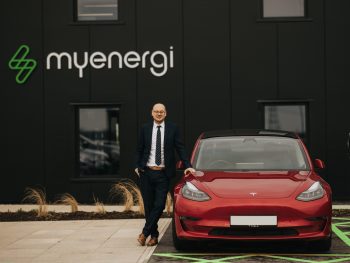EV charging will help, not hamper the grid, trials reveal
Electric vehicles could be the largest contributor to flexible capacity in our electricity grid, a new study indicates.

Lee Sutton, Myenergi co-founder and CEO
While smart home energy specialist Myenergi says many, if not most, EVs will be charged off-peak by default, data captured by the firm also shows that on-peak charging will be flexible; able to be remotely paused or turned down to support the grid, without inconveniencing users.
In recent months, the company has supported UK grid events with thousands of customers signed up to offer flexible capacity. Its Zappi solar EV charger has been used to manage more than 13MW of aggregated flexible capacity in total – equivalent to the average power consumption of c.40,000 homes.
If the grid is constrained, EV chargers are able to respond and give back capacity. As an illustration, once commands have been sent, Zappi chargers have responded to grid events by reducing their consumption by an average of 2.4kW per household.
Myenergi said the trial shows that smart charging offers far more flexible capacity than other demand-side response (DSR) platforms, which have largely just seen consumers reduce home energy consumption by turning off lights and other appliances.
Lee Sutton, co-founder and CEO, elaborated: “Data we have collected from recent grid events prove that, far from being a hindrance on the electricity system, electric vehicles are ready to deliver huge benefits in terms of the flexible capacity when they shift charging demand to avoid grid constraints. While we recognise that consumer incentives will be a feature of the market, what is especially impressive is that we have been able to deliver this simply by asking customers to sign up to our DSR service.
“Done right, grid flexibility should not inconvenience consumers. Indeed, it’s clear that our customers have barely noticed these brief interruptions to their EV charging, as their vehicles have invariably still been able to finish charging.”
Sutton added: “Demand-side response is therefore about intelligent devices responding autonomously to remote commands. If it is to be successfully and widely – rather than grudgingly – adopted by consumers at scale, it really needs to be happening without the user even noticing. The industry should not be sending the message that the future of our energy system is contingent on everyone rushing around just before 5:30pm to switch off all their appliances and light some candles.”
Myenergi’s Zappi smart EV chargers can be instructed to pause or reduce consumption – and the firm says that ‘turn up’ events will be much more likely in the future, where the grid will have a surplus of clean, renewable electricity and will request chargers switch on or increase their consumption to soak up this excess supply, rather than energy providers being forced to turn off this generation.

